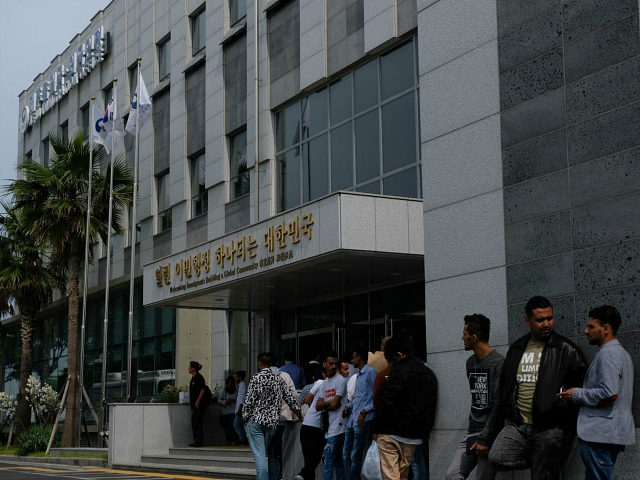Al-Arabiya ran an article on Tuesday in which Yemeni refugees staying on South Korea’s Jeju Island spoke about their “asylum struggles,” particularly their efforts to move from the island to the South Korean mainland.
The tiny, iconoclastic resort island has been swamped with hundreds of Yemeni refugees fleeing the violent civil war in their own country. The Yemenis originally fled to Malaysia, but took advantage of cheap airfare and loose visa policies to move along to Jeju when their temporary asylum in Malaysia ended. The South Korean government tightened visa policies to prevent further refugees from pouring into Jeju, and also blocked refugees from leaving Jeju to enter the mainland.
Al-Arabiya set out to interview the asylum-seekers about their travails, although the article only quotes one of them, a man named Bassam Mohamed, and none of his remarks are transcribed literally. In short, Mohamed praised the South Korean government for doing everything it could to accommodate the new arrivals and thanked the islanders for their charity, while also noting that some demonstrations have been held against the refugees.
Mohamed believed the protesters are unduly nervous about the Yemeni refugees because of news coverage of terrorism in the Middle East. It should be noted protesters also claim the special exemptions granted to the Yemenis by national and island officials are violations of South Korean law, and they seem more alarmed by reports of crime from European cities overwhelmed by refugees than by Middle Eastern terrorism.
His primary criticism of the South Korean government’s approach was that some of the Yemenis have advanced degrees but cannot find professional work on the island, instead taking jobs in fishing and agriculture. He said this is a major reason why the Yemenis want permission to move on to Seoul and other mainland cities.
The Korea Times printed a letter on Tuesday from a Yemeni refugee named Esmail Alqublani. A journalist by trade, Alqublani memorialized the refugees who died fleeing Yemen’s civil war and said the survivors are “looking for a safe and stable life.”
“Very long distances no one dreamed of crossing, but the war forced us, and we are now safely here on the island of humanity Jeju,” he wrote. “I am grateful to thank the Korean government and the immigration bureau of the local government and all those who helped in helping us and standing with us in any way.”
“For those who stood up against us, we must respect their opinion and accept it with full confidence,” Alqublani added. “The war forced us to go to different parts of the world. Some even got stuck or drowned because of the fools who sold our country to war.”
Like many tourist destinations, Jeju has an occasionally uneasy relationship with visitors and worries that an influx of permanent foreign residents from anywhere could disrupt the island’s unique culture and damage its economy. Island officials are currently considering a hefty “environmental tax” for visitors due to “a sharp rise in waste and air pollution” from tourists, for example.
The Financial Times mentioned Esmail Alqublani in a June 30 article as an example of another South Korean criticism of the refugees: they do not look like desperate “war-ravaged refugees” and they arrived on commercial airliners. Yemeni representatives have explained that only those with the money and connections to arrange international travel were able to escape from Yemen, which is also why so many of them have advanced degrees that render them overqualified to work on fishing boats.
FT noted that South Korean President Moon Jae-in, whose parents were refugees from North Korea, has not spoken on the Jeju Island controversy yet, but he will soon be obliged to do so because a petition to the presidential Blue House has gathered more than enough signatures to require an official response.
The South Korean government announced last week that the application process for asylum will be shortened in response to the Yemeni situation. The process as it stands can take several years to complete, and only a very small percentage of applicants are accepted. The decision to accelerate the procedure in as-yet-unspecified ways is seen as potentially troubling by both sides of the refugee issue, as it could either mean that more refugees will be accepted for permanent residence and free travel to the mainland more quickly, or that more of them will be rejected and asked to leave.

COMMENTS
Please let us know if you're having issues with commenting.